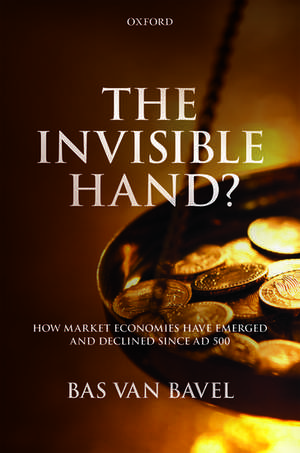The Invisible Hand?: How Market Economies have Emerged and Declined Since AD 500
Autor Bas van Bavelen Limba Engleză Hardback – 7 iul 2016
| Toate formatele și edițiile | Preț | Express |
|---|---|---|
| Paperback (1) | 188.52 lei 31-37 zile | +74.17 lei 4-10 zile |
| OUP OXFORD – 29 apr 2019 | 188.52 lei 31-37 zile | +74.17 lei 4-10 zile |
| Hardback (1) | 373.82 lei 31-37 zile | |
| OUP OXFORD – 7 iul 2016 | 373.82 lei 31-37 zile |
Preț: 373.82 lei
Preț vechi: 434.22 lei
-14% Nou
Puncte Express: 561
Preț estimativ în valută:
71.55€ • 77.75$ • 60.14£
71.55€ • 77.75$ • 60.14£
Carte tipărită la comandă
Livrare economică 10-16 aprilie
Preluare comenzi: 021 569.72.76
Specificații
ISBN-13: 9780199608133
ISBN-10: 019960813X
Pagini: 344
Dimensiuni: 161 x 241 x 25 mm
Greutate: 0.66 kg
Editura: OUP OXFORD
Colecția OUP Oxford
Locul publicării:Oxford, United Kingdom
ISBN-10: 019960813X
Pagini: 344
Dimensiuni: 161 x 241 x 25 mm
Greutate: 0.66 kg
Editura: OUP OXFORD
Colecția OUP Oxford
Locul publicării:Oxford, United Kingdom
Recenzii
Bas Van Bavel has given both public policy and comparative institutional history a great boost by asking big questions about where we are in the history of economic development, looking at contemporary quandaries through the lens of long-term historical patterns.
Starting from a sharp focus on fundamental problems -- the long-term effects of society on market economies, the management of catastrophes -- Bas van Bavel tests existing theories and clearly formulates his innovative insights.
Bavel is excellent in providing numerical estimates... It is not only the plausibility of the mechanism of decline that gives strength to Bavel's thesis; it is also that he lists the manifestation of the decline
A brief review...cannot do justice to wealth of material in this important new book, other than by noting that anyone interested in these issues should not miss it.
This a beautifully written book, easy to read, which makes it adequate for a wide audience. Above all, it is an original and intellectually challenging piece of scholarly work that breaks new historical grounds. Van Bavel is one of the few scholars alive who is equally an expert on history, economics, politics. This characteristic enables him a truly subtle analysis of texts and ideas. I want to make clear at the outset that economists and economic historians neglect this book at their peril, since it represents a methodological challenge to research as usual ... this book is going to be a vital contribution to the advancement of economic discourse as well as a crucial intervention in current political debate.
Van Bavel's deep expertise in the subject matter weaves an intricate web of connections of cultural, economic, and social aspects across time and space, and seamlessly draws the reader into a wonderful account
any social scientist interested in "big think" questions will benefit greatly from reading The Invisible Hand? While it presents only a piece of the "great divergence" puzzle, it is an understudied piece that is an important complement to existing theories based on institutions, culture, and governance.
Starting from a sharp focus on fundamental problems -- the long-term effects of society on market economies, the management of catastrophes -- Bas van Bavel tests existing theories and clearly formulates his innovative insights.
Bavel is excellent in providing numerical estimates... It is not only the plausibility of the mechanism of decline that gives strength to Bavel's thesis; it is also that he lists the manifestation of the decline
A brief review...cannot do justice to wealth of material in this important new book, other than by noting that anyone interested in these issues should not miss it.
This a beautifully written book, easy to read, which makes it adequate for a wide audience. Above all, it is an original and intellectually challenging piece of scholarly work that breaks new historical grounds. Van Bavel is one of the few scholars alive who is equally an expert on history, economics, politics. This characteristic enables him a truly subtle analysis of texts and ideas. I want to make clear at the outset that economists and economic historians neglect this book at their peril, since it represents a methodological challenge to research as usual ... this book is going to be a vital contribution to the advancement of economic discourse as well as a crucial intervention in current political debate.
Van Bavel's deep expertise in the subject matter weaves an intricate web of connections of cultural, economic, and social aspects across time and space, and seamlessly draws the reader into a wonderful account
any social scientist interested in "big think" questions will benefit greatly from reading The Invisible Hand? While it presents only a piece of the "great divergence" puzzle, it is an understudied piece that is an important complement to existing theories based on institutions, culture, and governance.
Notă biografică
Bas van Bavel is distinguished professor of Transitions of Economy and Society at Utrecht University. He acts as the academic director of the Utrecht University interdisciplinary priority area -- Institutions for Open Societies -- and he is a member of the Royal Dutch Academy of Sciences.His research activities focus on reconstructing, analyzing, and explaining economic development and social change, emphasizing long-term transitions and regional diversity, and using comparative analysis -- both over time and across regions -- as the main tool. More specifically, he aims to find out why some societal arrangements are successful in generating wealth, equity and resilience, and others not, and what drives the formation of these arrangements.



















